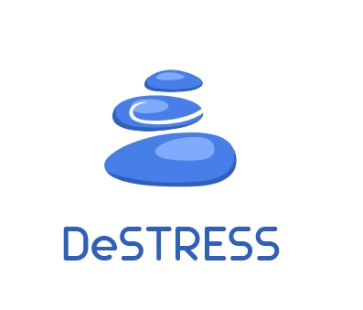Developing Competencies for Stress Resilience @SMEs
Investigadora
Developing Competences for Stress Resilience @SMEs (DeSTRESS) aims to provide an innovative VET-based solution to this problem. Building on existing research, partners will develop a VET curriculum supported by an innovative VET Digital Training Platform using the latest techniques in game-based training and gamification, complemented by a set of practical tools and resources to facilitate the transfer of learning into the workplace. This environment will expose the main psychosocial health risks and their real impact on the individuals’ life and on the companies’ productivity. Players will assume roles, enabling them to think back on their experiences with these specific situations and how it happened, and which solutions are available for each scenario. Besides raising awareness on the problem, the project outputs will enable owner, managers and even decision makers to plan for and to mitigate its occurrence and the negative consequences of work- based stress. For that purpose, both a policy report and recommendations will be produced. A network of facilitators will also be created as an open forum to debate these issues. As such, the project will contribute to strengthening key digital competences in initial VET while preventing the inherent hazards.
Informação do Projeto
2019-09-01
2022-05-31
Parceiros do Projeto
- BRU-Iscte - Líder
- CCS Digital Education Limited - (Irlanda)
- Fundacja “Malopolska Izba Samorzadowa” - (Polónia)
- USE - (Espanha)
- Universita degli Studi di Verona - (Itália)
- Universita degli Studi di Verona - (Itália)
- Virtual Campus LDA - (Portugal)
- Creative Thinking Development - (Grécia)
University Community Engagement in Technologies for Sustainability: a Social Architecture.
Investigadora
O objetivo do financiamento por parte da Fundação Calouste Gulbenkian é fomentar a alteração dos comportamentos dos utilizadores do campus do ISCTE-IUL para reduzir o consumo de energia e melhorar a sustentabilidade ambiental do campus. Irá conjugar conhecimentos da Psicologia, Engenharia, Arquitetura e Informática, envolvendo toda a comunidade ISCTE-IUL e serão implementadas estratégias IoT, de economia comportamental e gamificação com a ligação aos modelos BIM.
O projeto desenvolve-se ao longo de 4 fases sequenciais:
1ª fase: Diagnóstico da situação atual: a. Análise da perceção da comunidade ISCTE-IUL em matéria de sustentabilidade ambiental; b. Instalação de sensores com vista à medição dos comportamentos energéticos dos utentes do ISCTEIUL (e.g. temperatura, humidade, luminosidade, ruído e consumo de energia).
Objetivos:
1) Diagnóstico da perceção da comunidade baseado em inquéritos à população alvo. Feedback recebido irá servir para identificar os principais requisitos e aproximações da nossa plataforma. Indicadores – Relatório com variáveis, recolha e análise de dados. Metas – Avaliar uma amostra representativa de pessoal não docente, docente, estudantes e visitantes.
2) Recolha em tempo real de dados de sensores e respetiva análise em plataforma de IoT para identificação de padrões e comportamentos. Indicadores – leitura dados em tempo real identificação padrões. Relatórios semanais, mensais, anuais. Informação em tempo real em dispositivos móveis. Metas – instalação de medições em 20 locais (leitura energia, qualidade ar, luminosidade, temperatura, ruído).
2ªfase: Definição de objetivos para a redução do consumo energético, tendo em conta o baseline quantitativo e qualitativo construído na 1ª fase do projeto relacionado com o cálculo da pegada ecológica (consumos) por indivíduo, sala, departamento, edifício. Indicadores – métricas de consumos por pessoa, sala, departamento e edifício. Análise de comportamentos e respetiva quantificação
Metas ...
Informação do Projeto
2019-04-01
2021-03-31
Parceiros do Projeto
- ISTAR-Iscte (SSE) - Líder
- BRU-Iscte
- CIS-Iscte
The meaning of CSR - A cross-European perspective
Investigadora Responsável
Corporate Social Responsibility (CSR) has received substantial attention in Europe in the last decade. An incremental number of initiatives gave it high visibility both in the academia and in the public sphere. However, there is scarce research on the meanings attributed by the European public to CSR, and how these relate to their values, identities and choices as consumers. Moreover, there is a lack of comparative studies that can help to better understand how supra-national regulations contribute to the circulating representations about CSR. This project intends to examine the current social representation of CSR in different countries across Europe. The main goal is to develop a comparative perspective between member-states that have entered the European Union in different accession phases (France, Italy, Spain, Portugal, and Slovenia), and have thus different time-frames of exposure to EU soft laws on CSR. This will also allow to update the knowledge about the social representation of CSR in relation to previous research (Duarte, et al., 2010, Golob, 2011), and analyze whether it has kept stable or changed in the last decade. A second goal is to examine psychosocial factors that can contribute to identify segments of the public that are differently engaged with the CSR principles and practices. Three factors are examined in this project: values, pro-environmental identity and sustainable consumption behaviors. Crossing these variables will allow us to examine if and how are these individual characteristics associated with a specific representation of CSR at the country-level. The project will allow gathering information that contributes for a better understanding of the relationship the European publics establish with companies’ socially responsible principles and practices.
Informação do Projeto
2018-11-01
2021-10-30
Parceiros do Projeto
- BRU-Iscte (OB&HR) - Líder
- CIS-Iscte (PsyChange)
- Aix-Marseille Université - (França)
- Universidad de Extremadura - (Espanha)
- Sapienza, University of Rome - (Itália)
- Kaunas University of Technology - (Lituânia)

 English
English


